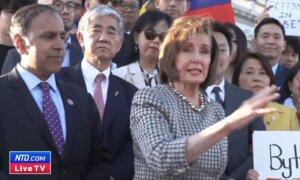‘This law is not just about TikTok, it is about censorship and government control!’
Elon Musk raised concerns on Tuesday regarding a proposed bill aimed at banning the Chinese-owned app TikTok, suggesting that provisions within the legislation could intensify censorship and government control of social media platforms.
“This law is not just about TikTok, it is about censorship and government control!” Mr. Musk wrote in a post on X. “If it were just about TikTok, it would only cite ‘foreign control’ as the issue, but it does not.”
Mr. Musk’s remarks were prompted by a post from Rep. Thomas Massie (R-Ky.), who voiced opposition to the bipartisan bill.
Mr. Massie, citing the text of the legislation, labeled the proposed ban as a “trojan horse.”
“The so-called TikTok ban is a trojan horse. The President will be given the power to ban WEB SITES, not just Apps. The person breaking the new law is deemed to be the U.S. (or offshore) INTERNET HOSTING SERVICE or App Store, not the ‘foreign adversary,’” Mr. Massie wrote.
The specific clause within the bill’s text that alarms Mr. Massie and Mr. Musk defines the term “foreign adversary controlled application,” as encompassing “a website.”
Both Mr. Musk and Mr. Massie pointed to a provision in the bill penalizing internet hosting services for distributing, maintaining, or updating a “foreign adversary controlled application” within the United States.
Bipartisan Bill
The Senate recently passed the bill, which subsequently gained unanimous approval from the House Committee on Energy and Commerce.
This legislation, H.R. 7521, known as the Protecting Americans from Foreign Adversary Controlled Applications Act, carries substantial implications for TikTok.
If passed by Congress, the bill would compel TikTok to sever ties with its Chinese parent company, ByteDance, within six months. Failure to comply would result in a ban on TikTok within the United States.
The House is expected to vote on the bill on Wednesday.
President Joe Biden has already said he would sign the bill into law.
In response to these developments, TikTok has actively encouraged its American users to voice their opinions, a move that has drawn both attention and criticism from lawmakers.
In a notable exchange, leaders from both major parties on the House Select Committee on the Chinese Communist Party (CCP) penned a letter to TikTok, accusing the platform of disseminating misinformation and mobilizing citizens in favor of the CCP’s interests.
The letter highlighted a specific instance where TikTok urged users via a pop-up message to “speak up now, before your government strips 170 million Americans of their Constitutional right to free expression.”
This outreach effort by TikTok sparked controversy, with Reps. Mike Gallagher (R-Wis.) and Raja Krishnamoorthi (D-Ill.), the committee’s ranking member, condemning the platform’s tactics.
TikTok Is Not Like Other Apps Because It’s Beholden to the CCP
Brendan Carr, the senior Republican commissioner on the Federal Communications Commission, highlighted TikTok’s unique vulnerability to CCP influence during an interview on The Epoch Times’ “American Thought Leaders: Now“ program.
Mr. Carr said that TikTok, like any entity operating within China, is subject to stringent national security laws mandating them “to do the bidding of the CCP surveillance apparatus, and to keep it secret.”
Mr. Carr noted that TikTok’s transgressions persisted even during negotiations with U.S. officials to address national security concerns. This behavior, he argued, reflects TikTok’s inability to uphold commitments due to its allegiance to the CCP, contrasting with the accountability typical of other social media companies.
On Tuesday, former President Donald Trump echoed concerns regarding TikTok’s national security implications, but cautioned against its ban potentially bolstering rivals like Facebook, which he also criticized as an “enemy of the people.”
President Trump emphasized the imperative of safeguarding American privacy and data rights while acknowledging TikTok’s mixed impact.
“There’s a lot of good, and there’s a lot of bad with TikTok. But the thing I don’t like is that without TikTok, you can make Facebook bigger, and I consider Facebook to be an enemy of the people along with a lot of the media,” he said.
During his time in office, President Trump issued an executive order in 2020 identifying China-owned apps as threats to national security, foreign policy, and the U.S. economy. However, legal challenges from TikTok impeded the implementation of these measures. This was in part because the president needed authority from Congress.
Original News Source Link – Epoch Times
Running For Office? Conservative Campaign Consulting – Election Day Strategies!


